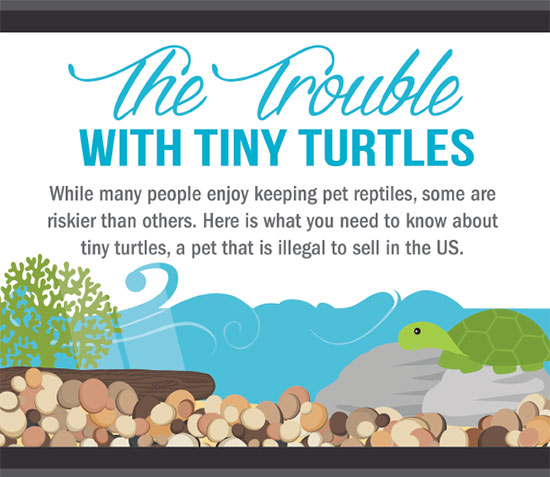2015 Salmonella Outbreak Linked to Small Turtles – Advice to Pet Owners
Salmonella Infections Linked to Small Turtles
- Do not purchase, or give as a gift, turtles with a shell length of less than 4 inches in size.
- Wash hands thoroughly with soap and water immediately after handling turtles or anything in the area where they live or roam, or after contact with pet feces. Do not touch your face, other people or any surface until hands have been washed.
- Keep turtles out of homes with children younger than 5 years, adults older than 65 years, or people with weakened immune systems.
- Do not handle a turtle and an infant (such as feed, change diaper, or bathe) at the same time.
- Turtles and other reptiles should not be kept in child care centers, schools, or other facilities with children younger than 5 years.
- Do not allow turtles to roam freely in the home or living area, especially in food preparation areas.
- Thoroughly clean and disinfect bathtubs that are used to bathe turtles or wash their dishes, cages, or aquariums. Kitchen sinks should not be used for these purposes.
- Learn more about reducing the risk of illness [PDF – 1 page] from turtles and follow these simple steps to enjoy pet turtles and keep your family healthy.
Options for Unwanted Turtles
- Releasing unwanted turtles into the wild is not recommended. Many pet retailers, pet stores, local animal shelters, zoos, or turtle rescues accept unwanted turtles. Talk to your veterinarian about other options.
Advice to People Who Sell Turtles
- Pet stores, street vendors, and others should not sell or distribute turtles with shell lengths less than 4 inches. Be aware that federal law prohibits the distribution of these small turtles.
- Distribution of pet turtles includes offering them for adoption or for free with or without the purchase of pet supplies such as turtle tanks or food.
- Pet stores, street vendors, and others who sell or display turtles should provide health information to owners and potential purchasers of turtles near the turtle display and not at the cash register.
- This should include information about the risk of acquiring a Salmonella infection from turtles or from water in their habitats (tanks or aquariums), and instructions for proper cleaning of the turtle habitat.
- Posters containing this information are available in English, Spanish, French, and Chinese.
- More information on displaying animals in public settings can be found in the 2013 Compendium of Measures to Prevent Diseases Associated with Animals in Public Settings. [PDF – 19 pages]
Advice to Health Care Providers
- Health care providers should ask patients and patient caregivers about pet and animal ownership and should provide education about the risks of acquiring salmonellosis from pet reptiles.
- Health care providers should teach patients and patient caregivers about proper hand washing practices.
Advice to Veterinarians
- Veterinarians should provide education to reptile owners about the risks of acquiring salmonellosis from these animals and how to safely clean the animal habitat.
